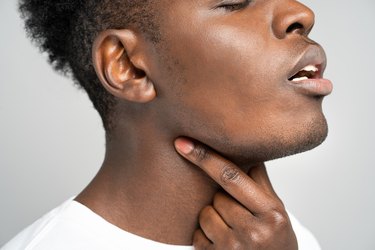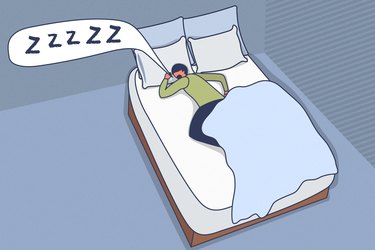
If you spend time sawing wood at night, you're in good company. Ninety million Americans snore at least sometimes, according to Yale Medicine.
"Snoring is extremely common," says Tonia Farmer, MD, a board-certified ear, nose and throat surgeon in Warren, Ohio. (You can also find her educational content on TikTok @drnosebest.)
Video of the Day
But nightly symphonies of snoring don't have to be you (or your partner's) reality.
Here are some tongue and chin exercises Dr. Farmer recommends to help reduce snoring, and when to see a doctor if it's really getting in the way of a restful night's sleep.
What Is Snoring?
First, it helps to actually understand what's going on when you snore up a storm. "Snoring is a partial collapse of the upper airway," Dr. Farmer says.
Normally, air flows through your nose, travels through a host of tissues and enters your lungs in an unobstructed way. But when you snore, your soft palate (the roof of your mouth), tongue and tonsils collapse and block the way to consistent breath.
"Snoring is the sound that's made as air flows through the airway and reverberates through all of that collapsing tissue," Dr. Farmer says.
What Causes Snoring?
Anything that leads to a partial (or full) collapse of your airway will cause snoring. You are more likely to snore if any of the below applies to you.
Overweight or Obesity
"The weight that someone carries can squeeze more on the airway and cause an airway collapse," Dr. Farmer says.
A higher body mass index is associated with higher chances of snoring, with about 71 percent of people with obesity snoring versus 36 percent of people without obesity or overweight, per a May 2015 analysis involving more than 8 million people in The Laryngoscope.
Alcohol or Certain Medications
Substances that make you sleepy, such as alcohol and certain antihistamines, antidepressants and muscle relaxants, can contribute to snoring because these drugs can make your muscles more relaxed — which includes the muscles in the airways, Dr. Farmer says.
Anatomical Obstructions
If you have big tonsils and adenoids, an especially small jaw, a deviated septum or nasal polyps (noncancerous growths on the lining of your nasal passage, per the Mayo Clinic), they may be blocking your airways.
"These are all breathing obstructions that can contribute to snoring," Dr. Farmer says.
Colds or Allergies
If you have more mucus in your sinuses due to a cold or allergies, you may notice you're snoring more than usual. (Or, your bed partner is telling you so.)
"When you're sick, you tend to breathe more through your mouth, which makes your palate vibrate more," Dr. Farmer says.
Sleep Apnea
Obstructive sleep apnea is a sleep-related breathing disorder where your throat muscles relax and block your airway while you sleep, per the Mayo Clinic. This causes you to stop breathing for brief moments at night.
Unlike the other causes mentioned here, "apnea is a complete collapse of the airway, so that no air is flowing through whatsoever," Dr. Farmer says.
Loud snoring is a common symptom of apnea, along with excessive daytime sleepiness, morning headaches and difficulty concentrating during the day, per the Mayo Clinic.
What Are Traditional Snoring Treatments?
Apart from certain exercises (more on that below), there are some traditional medical routes you can take to remedy snoring. After you've determined the cause of your snoring, look to address it. According to Dr. Farmer, potential treatments might include:
- Losing weight: Or, reaching a healthy-for-you weight.
- Avoiding alcohol at night: Contrary to popular belief, alcohol can actually disturb sleep.
- Sleeping with your head more elevated: This sleep position keeps tissues in the back of your throat from collapsing.
- Changing the time of day you take certain medications: Always talk to your doctor before adjusting medications.
- Seeing a board-certified allergist: Pollen and dust are often allergen culprits.
- Surgery: Tonsil removal (tonsillectomy), adenoid removal (adenoidectomy), palate surgery and correcting a deviated septum can all help.
- Wearing an oral appliance for snoring: Try a night guard.
- Using a CPAP machine: This is a machine that keeps airways open during sleep to treat obstructive sleep apnea.
7 Exercises That May Reduce Snoring
An additional non-invasive treatment you can try is myofunctional therapy, which is used for snoring, swallowing and speech difficulties, Dr. Farmer says.
Myofunctional therapy involves "exercising the tissues around the mouth, jawline and face in order to improve the tone of these muscles," she says. By building up these tissues, they are less likely to collapse during the night, keeping your airway open — and leading to less snoring.
Myofunctional therapy can be an effective sleep apnea treatment, per a May 2015 review in Sleep. These types of tongue exercises can reduce snoring intensity by as much as 51 percent and cut the time spent snoring during the night by 31 percent in some people, according to a December 2017 study in the European Archives of Oto-Rhino-Laryngology.
We asked Dr. Farmer to share some exercises with LIVESTRONG.com that she'd recommend. You can watch her demonstrate them in the videos below.
Repeat all of these exercises 10 times, twice a day.
1. Tongue Push-Up
- Push your tongue as hard as you can into the roof of your mouth.
- Hold for 10 seconds.
2. Nose Touch
- Try to touch the tip of your nose with your tongue.
- Hold for 10 seconds as far as you can go.
3. Chin Touch
- Try to touch the tip of your tongue to your chin.
- Hold for 10 seconds.
4. Left Cheek Touch
- Stick your tongue out and stretch it all the way to the left.
- Hold for 10 seconds.
5. Right Cheek Touch
- Stick your tongue out and stretch it all the way to the right.
- Hold for 10 seconds.
6. Tongue Push-Up With a Spoon
- Hold a spoon in front of your mouth.
- Stick your tongue straight out and press it against the spoon for resistance.
- Hold for 10 seconds.
7. Spoon Hold
- Insert the handle of a spoon into your mouth.
- Hold the spoon handle between your tongue and your lips (not your teeth) for 10 seconds. You can also hold the spoon underneath your tongue for 10 seconds instead.
Tip
Looking for more guidance? Ask your doctor for a referral to a physical therapist, speech therapist or dentist or oral surgeon who may be able to walk you through additional snoring exercises that are right for you.
When Can You Expect Results?
While myofunctional exercises are free, accessible and done in your own home, they do take time and may not be totally effective for everyone, Dr. Farmer says.
She recommends doing myofunctional therapy exercises for 30 to 45 minutes each day for 6 to 12 months — perhaps longer — before you see improvement in snoring or sleep apnea. That said, 30 minutes a day is a big time commitment. Even doing these exercises for five to 10 minutes, twice a day, can have a positive effect on snoring and the hypopnea index for sleep apnea, Dr. Farmer says.
For even better results, combine tongue exercises with other treatments, such as an oral appliance, changing your sleep position or skipping alcohol at night.
When to See a Doctor
Often, "it's your bed partner's insistence that sends you to the doctor for snoring," Dr. Farmer says.
If you don't have a bed partner or a roommate who complains, it can be tough to know if you're snoring at all. If you experience the following symptoms of disruptive sleep, talk to your doctor who may evaluate you for a condition like sleep apnea:
- You wake up with headaches.
- You fall asleep easily during the day.
- You wake yourself up at night (from snoring)
- You're still tired during the day even after a full night's sleep
If you snore and also have high blood pressure or a history of a heart attack, stroke or heart disease, Dr. Farmer recommends getting checked for obstructive sleep apnea.
- Yale Medicine: “Snoring”
- StatPearls: “Anatomy, Head and Neck, Palate”
- The Laryngoscope: “Sleep and health implications of snoring: A populational analysis”
- Mayo Clinic: “Obstructive Sleep Apnea”
- SLEEP: “Myofunctional Therapy to Treat Obstructive Sleep Apnea: A Systematic Review and Meta-Analysis”
- European Archives of Oto-Rhino-Laryngology: “Oropharyngeal and tongue exercises (myofunctional therapy) for snoring: a systematic review and meta-analysis”
- Mayo Clinic: "Nasal Polyps"
Is this an emergency? If you are experiencing serious medical symptoms, please see the National Library of Medicine’s list of signs you need emergency medical attention or call 911.


